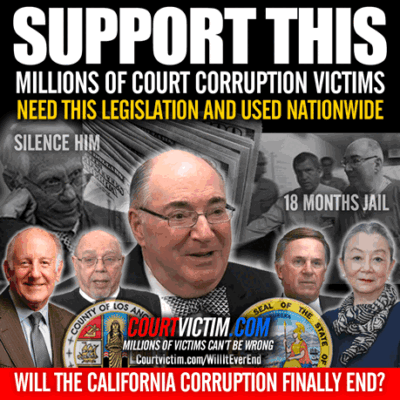Category: Richard I. Fine
Support this Bill to GET JUSTICE for ALL COURT VICTIMS Nationwide

History of SBX 211 and AB 2960 SBX 2 11 Commencing in the mid to late 1980s California Counties and State Superior Courts began paying State Superior Court judges (Trial Court judges) payments in addition to their State Compensation. These payments were called “Supplemental or Local Judicial Benefit Payments” (payments). California Constitution, Article VI, Section 19, required Judicial State Compensation could only be set by the California Legislature. The payments were held to violate the California Constitution in Sturgeon v. County of Los Angeles, 167 Cal.App.4th 630 (2008), Review Denied, 2009). In response, the California Legislature approved and Governor Schwarzenegger signed SBX 2 11 on February 20, 2009, Effective May 20, 2009: (1) allowing the payments to continue in Section 2 and adding such as Section 68220 to the California Government Code; (2) defining the payments to include salary, compensation, benefits 401K and 457K plans in Section 3 and adding such as Section 68221 to the California Government Code; (3) stating nothing in SBX 2 11 requires the Judicial Council to pay for judicial benefits or previous benefits in Section 4 and adding such as Section 68222 to the California Government Code. At all times, the payments violated both California and federal Criminal laws as “bribes” under California Criminal law and 18 U.S.C. Section 1346- “the intangible right to honest services” under Federal law. SBX 2 11 addressed the California violations in Section 5 with retroactive immunity as follows: “Notwithstanding any other law, no governmental entity, or officer or employee of a governmental entity, shall incur any liability or be subject to prosecution or disciplinary action because of benefits provided to a judge under the official action of a governmental entity prior to the effective date of this act on… Read More



